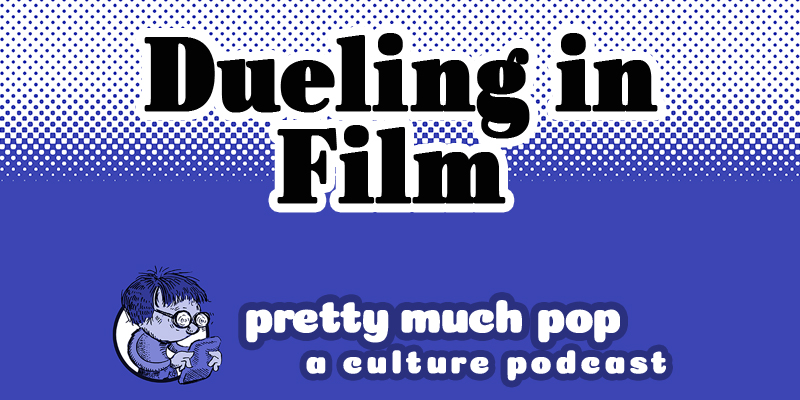[Most Recent Entries] [Calendar View]
Friday, November 26th, 2021
- “The Last Duel: Cinema’s 11 Best Showdowns” by Nicholas Barber
- “‘The Last Duel’ Is More Than Just Unsuccessful Oscar Bait” by Adam Nayman
- “The True History Behind ‘The Last Duel’” by Meilan Solly
- “Duelling Films” by Howard G. Brown
| Time | Event |
| 8:35a | Dueling as a Film Trope: Pretty Much Pop #109 Considers The Last Duel and Its Genre
In light of the release of The Last Duel (which you needn’t have watched), we talk about the trope of the honor-resolving duel in movies and TV. Mark and guest co-host Dylan Casey of The Partially Examined Life are joined by Clif Mark, host of the Good in Theory podcast who wrote his political thesis and a 2018 Aeon article on the history and logic of dueling. Since we’re all philosophy podcasters on this one (our entertainment podcaster guest dropped out at the last minute), we bring in philosophers like Hegel and Nietzsche in as needed, the circle of ethical concern (who gets moral status and so is worthy to duel?), and of course the relevant class and gender critiques. We also touch on The Duelists (incidentally, Ridley Scott’s directing debut, where The Last Duel is his latest), The Duelist and The Duel (two 2016 films), A Knight’s Tale, The Princess Bride, Dune, Hamilton, Bridgerton, The Karate Kid, and more. For more information on the specter of dueling in politics, read about Justin Trudeau and Trump/Biden. Some articles that fed our discussion (in addition to Clif’s “What Is Offensive”) include: Follow Clif @Clifton_Mark. This episode includes bonus discussion you can access by supporting the podcast at patreon.com/prettymuchpop or by choosing a paid subscription through Apple Podcasts. This podcast is part of the Partially Examined Life podcast network. Pretty Much Pop: A Culture Podcast is the first podcast curated by Open Culture. Browse all Pretty Much Pop posts. Dueling as a Film Trope: Pretty Much Pop #109 Considers The Last Duel and Its Genre is a post from: Open Culture. Follow us on Facebook and Twitter, or get our Daily Email. And don't miss our big collections of Free Online Courses, Free Online Movies, Free eBooks, Free Audio Books, Free Foreign Language Lessons, and MOOCs. |
| 9:00a | The Drugs Used by the Ancient Greeks and Romans Many of us living in the parts of the world where marijuana has recently been legalized may regard ourselves as partaking of a highly modern pleasure. And given the ever-increasing sophistication of the growing and processing techniques that underlie what has become a formidable cannabis industry, perhaps, on some level, we are. But as intellectually avid enthusiasts of psychoactive substances won’t hesitate to tell you, their use stretches farther back in time than history itself. “For as long as there has been civilization, there have been mind-altering drugs,” writes Science‘s Andrew Lawler. But was anyone using them in the predecessors to western civilization as we know it today? For quite some time, scholars believed that unlike, say, Mesoamerica or north Africa, “the ancient Near East had seemed curiously drug-free.” But now, “new techniques for analyzing residues in excavated jars and identifying tiny amounts of plant material suggest that ancient Near Easterners indulged in a range of psychoactive substances.” The latest evidence suggests that, already three millennia ago, “drugs like cannabis had arrived in Mesopotamia, while people from Turkey to Egypt experimented with local substances such as blue water lily.” That these habits seem to have continued in ancient Greece and Rome is suggested by archaeological evidence summarized in the video above. In 2019, archaeologists unearthed a few precious artifacts from a fourth-century Scythian burial mound near Stavropol in Russia. There were “golden armbands, golden cups, a heavy gold ring, and the greatest treasure of all, two spectacular golden vessels,” says narrator Garrett Ryan, who earned a PhD in Greek and Roman History from the University of Michigan. The interiors of those last “were coated with a sticky black residue,” confirmed in the lab to be opium with traces of marijuana. “The Scythians, in other words, got high” — as did “their Greek and Roman neighbors.” Ryan, author of Naked Statues, Fat Gladiators, and War Elephants: Frequently Asked Questions about the Ancient Greeks and Romans, goes on to make intriguing connections between scattered but relevant pieces of archaeological and textual evidence. We know that some of our civilizational forebears got high; how many, and how high, are questions for future scholastic inquiry. Related Content: Algerian Cave Paintings Suggest Humans Did Magic Mushrooms 9,000 Years Ago Discover the Oldest Beer Recipe in History From Ancient Sumeria, 1800 B.C. Pipes with Cannabis Traces Found in Shakespeare’s Garden, Suggesting the Bard Enjoyed a “Noted Weed” 1,000-Year-Old Illustrated Guide to the Medicinal Use of Plants Now Digitized & Put Online Beer Archaeology: Yes, It’s a Thing Based in Seoul, Colin Marshall writes and broadcasts on cities and culture. His projects include the book The Stateless City: a Walk through 21st-Century Los Angeles and the video series The City in Cinema. Follow him on Twitter at @colinmarshall or on Facebook. The Drugs Used by the Ancient Greeks and Romans is a post from: Open Culture. Follow us on Facebook and Twitter, or get our Daily Email. And don't miss our big collections of Free Online Courses, Free Online Movies, Free eBooks, Free Audio Books, Free Foreign Language Lessons, and MOOCs. |
| 12:00p | Blade Runner and Alien TV Shows Confirmed by Ridley Scott
Ridley Scott is 83, and good on him for not slowing down. The Last Duel came and went, but it actually existed and was an original idea, based on a true historical event, and with a script from Nicole Holofcener, and featured a re-teaming up of Ben Affleck and Matt Damon. And as of this writing, House of Gucci is set to open and give us some salacious scandal and murder among the hoity and toit, just in time for Oscar season. He’s even recently dropped some hot takes against the superhero movie factory of Hollywood. So Scott’s doing well. Then why does this latest announcement feel so underwhelming? According to a BBC interview on Monday, Scott is also developing a 10-episode limited series based on Blade Runner *and* a limited series based on Alien, this time set on earth. It’s not totally clear how much Scott is actively involved. “We [have already] written the pilot for ‘Blade Runner’ and the bible,” he says, referring to the master plan of the 10 episodes. “So, we’re already presenting ‘Blade Runner’ as a TV show, the first 10 hours.” But who his co-creators are, we don’t know right now. And there are similar questions in the upcoming Alien series, which has been rumored since 2020. Noah Hawley, who turned the Coen Bros. Fargo into something like a jazz riff on the Coen’s films spread across several decades, is set to be the showrunner. The Blade Runner announcement has sent the pop media press into a tizzy, trying to guess where and when the new series will be set. After all, the 1982 film was set in a bleak, dystopian 2019, and the Denis Villeneuve sequel was set in a bleak, dystopian 2049. And it was only because of this announcement that I even knew of the Adult Swim animated series, Blade Runner: Black Lotus, which is set in a bleak, dystopian 2032. Times have changed, but the Los Angeles of the future sure hasn’t. So when will it take place? Who knows? Look, the two new series might be good, they might be meh, but Scott’s sudden prominence at the end of 2021 feels like an encapsulation of media’s divergent paths. On one hand you have his two films, both original content, one that might have a second life on streaming on and another that feels like it will have some buzz and lead people back to the cinema. Either way, they tell stories with beginnings, middles, and ends. On the other hand you have the continual franchise-ment of culture, revisiting and rehashing two excellent films from the early ‘80s that exist perfectly well as standalone stories. Do we really need more stories about the xenomorph? Do we need more stories about a very damp Los Angeles and its replicants? Is culture at a standstill? Are we doomed to recycle everything from the 1980s onward? However, if anybody should be making money off of Ridley Scott’s legacy it’s Scott himself. Leave your thoughts in the comments below, while I put on this Vangelis soundtrack. Related Content: Experience Blade Runner Like You Never Have Before Through a Feature-Length Remastered Soundtrack Three Blade Runner Prequels: Watch Them Online Ted Mills is a freelance writer on the arts who currently hosts the Notes from the Shed podcast and is the producer of KCRW’s Curious Coast. You can also follow him on Twitter at @tedmills, and/or watch his films here. Blade Runner and Alien TV Shows Confirmed by Ridley Scott is a post from: Open Culture. Follow us on Facebook and Twitter, or get our Daily Email. And don't miss our big collections of Free Online Courses, Free Online Movies, Free eBooks, Free Audio Books, Free Foreign Language Lessons, and MOOCs. |
| << Previous Day |
2021/11/26 [Calendar] |
Next Day >> |


